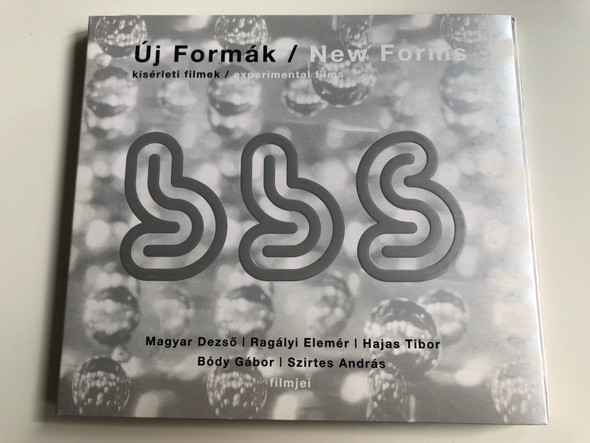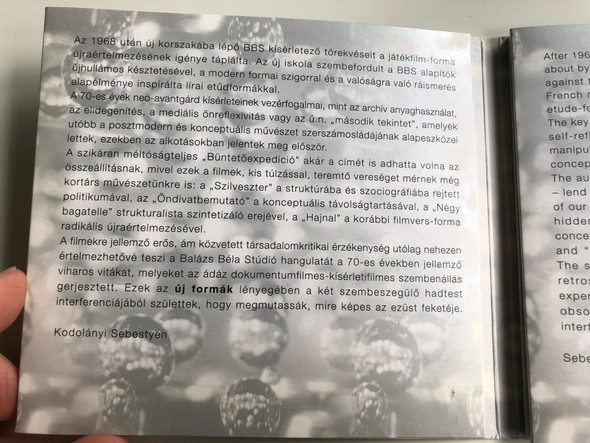Description
Amerikai Anzix (American Torso) 2x DVD Kutya Éji dala (Dog's night Song) / Directed by Bódy Gábor / Films by Bódy Gábor / Társulás Stúdió
REGION 2 PAL DVD
UPC 3858887027811
MADE IN EU
AUDIO: Hungarian mono
SUBTITLE: English
Total Runtime: 95 + 140 minutes
Hungarian Summary:
2 DVD BBS sorozat 6.
1 DVD AMERIKAI ANZIX 1975 95 perc fekete-fehér
Fsz: Csutoros Sándor(mh: Latinovits Zoltán), Cserhalmi György, Fekete András
A kísérleti film Észak-Karolinában játszódik. Az amerikai polgárháború utolsó napjaiban harcol az 1849-es magyar emigráció három jellegzetes alakja: Fiala János térképész-tüzértiszt, a tudós-racionalista, Vereczky Ádám, a hős-fatalista és Fiala segédje, az érzelmes, honvággyal küzdő Boldogh. A "lelassult forradalmárok" sorsa egyként kilátástalan. A virtuskodó Vereczky értelmetlen halált hal egy óriási hintán, melyet sikerül a teodolittal bemérnie. Boldogh hazavágyik, talán meghalni, Fiala előtt egyetlen lehetőség lebeg: részt vehet a Pacific vasút építésében.
2 DVD KUTYA ÉJI DALA 1983 140 perc
Fsz: Áldor Györgyné, Bódy Gábor, Derzsi János, Granpierre Attila, Hunyadkürthy István
A "Kutya éji dala" cím vagy a prérifarkas vonítása abból az ismert jelenségből indul ki, hogy a kutyák megugatják a holdat, ez az animális és a kozmikus kapcsolat állandóságára és rendszerességére utal. Az emberek bonyolultabb formában ugatják meg a kozmoszt. A film hat szereplőnek a szálait követi olyan formában, hogy töredékes jelenetek, töredékes életszeletek játszódnak le az ajtó mögött. A hat szereplő a társadalom különböző prototípusait jeleníti meg /volt tanácselnök, álpap, Attila, a kísérletező zenész, csillagász, a kisfiú, a mindenfelé nyitottság, a katonatiszt, a szép ösztönös feleség/, a rendező mindegyik személyt azonos közelségből láttatja. Az álmok pedig szerves összekötő anyagává válnak e kis töredék életeknek.
English Summary:
Gabor Body's films and the creative process through which they were delivered are equally exceptional; the irresistible suggestive power of the finished works makes them simultaneously avant-garde experiments and enjoyable movies - classics, each one in its own way.
About the director:
Bódy was born in Budapest, in an urban middle-class family. He studied history and philosophy at Loránd Eötvös University and later filmmaking at the Academy for Theater and Film Arts. During his university days he became an influential member of the Béla Balázs Stúdió (BBS). He made his first film A Harmadik (The Third) (a documentary about students preparing an adaptation of Faust on stage) in 1971. He established various experimental and avantgarde projects at BBS including the Film Language Series in 1973 and the K/3 experimental film group in 1976, reshaping the postwar Hungarian avantgarde film's path.
In 1975 he completed his debut feature at BBS, which was also his graduation thesis film at the university. Amerikai Anzix (American Torso) won the Grand Prize for best new filmmaker at ""International Filmfestival Mannheim-Heidelberg"" and the Hungarian Film Critics prize for best first film. The film which depicts the lives of Hungarian 1848 Revolution veterans in the American Civil War features Bódy's experimentalism at the fullest. The whole film was re-edited using his own method called "light editing" in order to make it resemble a wracked silent film from the late 19th century.
His next feature Nárcisz és Psyché was the largest-scale Hungarian production of its era. This epic production based on Sándor Weöres's poetic work Psyché starred Patricia Adriani, Udo Kier and György Cserhalmi and exists in three versions: an original 210-minute two-part version, a 136-minute version for foreign distribution and a 270-minute three-part television version.
In 1980 Bódy began to work on the first international video magazine INFERMENTAL and managed to publish the first of 10 issues (plus one special issue) while on a residency at DAAD Berliner Küunstlerprogram in 1982. The series published featured a range of guest editors and in total included work from over 1500 artists from 36 countries and was published up to 1991.
After many frustrated projects Bódy managed to complete what was to become his final feature film Kutya éji dala (Dog's Night Song). Bódy cast himself as the lead in this ambitious and influential feature which incorporated Super8 and video footage as well as a range of Hungarian underground punk bands (Galloping Coroners, Trabant) of the time in order to a film "deeply rooted in the fundamentals of today's reality."
In 1985 Bódy died under sketchy circumstances. A later published information (2001) hints his earlier collaboration (1973–1983) with the Hungarian Secret Police, the III/III. Authorities of the time (Hungary was then considered a 'satellite' country of the Soviet Union) stated that he had killed himself. His widow instead preferred a charge of murder against certain unidentified parties. No official investigation followed and Bódy's fate remains a mystery to this day.








 1.JPG)
 2.JPG)

















